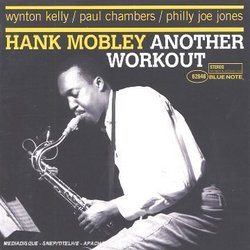| All Artists: Hank Mobley Title: Another Workout Members Wishing: 2 Total Copies: 0 Label: Blue Note Records Original Release Date: 1/1/2006 Re-Release Date: 8/15/2006 Genres: Jazz, Pop Style: Bebop Number of Discs: 1 SwapaCD Credits: 1 UPC: 094636264622 |
Search - Hank Mobley :: Another Workout
 | Hank Mobley Another Workout Genres: Jazz, Pop
|
Larger Image |
CD Details |
CD ReviewsBelongs on the same track as "Soul Station" Samuel Chell | Kenosha,, WI United States | 08/18/2006 (5 out of 5 stars) "I can scarcely remember the last time a "new" release has afforded as much immediate pleasure as this one. Go with a single horn player--arguably the most melodically fertile tenor saxophonist of his time--and give him the support of a rhythm section once cherry-picked by Miles Davis. The result is not merely predictable excellence but music that's frequently as surprising as it is satisfying. You may choose to view this session as Mobley's "Workout" minus Grant Green, but to my ears it's on the same track as the essential "Soul Station," the only difference being the drummers: Blakey's emotive forcefulness is replaced by Philly Joe Jones' finesse. Recorded in 1961, when Mobley was inarguably at the top of his game, "Another Workout" was not released until 1985, shortly after Capitol/EMI had purchased and resurrected the Blue Note label. That such music could have been suppressed for almost 24 years is called "incomprehensible" by Michael Cuscuna in the liner notes accompanying the 1985 release and "astonishing" by Bob Blumenthal in the notes written for this new 2006 remastered edition by Rudy Van Gelder. Add to those expressions a few other choice words, like "disgraceful," "ignorant," "unfortunate," even "unforgivable." Music of this order doesn't pass our way very often. In fact, this would be Mobley's last session before "No Room for Squares," the first session on which he would begin to sacrifice lyric inspiration and subtlety of phrasing to a harder sound and stiffer rhythmic approach as his answer to the demands of the 1960's marketplace. In other words, "Another Workout" is, in effect, the last opportunity to hear this quintessential player at his zenith. The opener, "Out of Joe," is Mobley's equivalent of Neal Hefti's "Cute," the drum vehicle written to showcase Sonny Payne's skills in the Count Basie Orchestra. But rather than serve as a mere display piece for the drummer, it features the tenor player and percussionist engaged in an intricate conversation, or dance, each responding to and elaborating on the cues supplied by the other musician. Although an unapologetic, romantic "singer" on the horn, Mobley is also all about musical sense, the last player to dress up or milk a sound. Nevertheless, his melodic inventiveness on the ballad, "I Should Care," can not detract from the sheer beauty of his tone. Warm, musky, complex, with the hint of a butterscotch flavor but steeped in the blues, Mobley's sound is addictive and habit-forming, incapable of wearing out its welcome. The highlight of the session is the leader's solo on the next tune, "Gettin' and Jettin'," an up-tempo original composed of 24 bars of G minor dorian, with an 8-bar bridge in a major key. Despite the limited chords and fast tempo, Mobley spins out eight beautiful choruses of infinite variety and nuance yet characterized by compositional definitiveness and wholeness. Melodically, Mobley makes quicker decisions than virtually any other tenor player, and on the rare occasions when he's stuck he'll repeat the same note 4-5 times rather than resort to a formulaic phrase or prepared "lick." Cuscuna's notes, included in this edition, are more reflective of what's on the record, in my opinion, than the new comments by Blumenthal. The latter provides interesting information about the recording's history, but I would regard suspiciously his suggestion that Wynton Kelly is not playing up to speed or that Mobley's playing on a couple of the tunes is not up to some later recordings. Probably best to stop reading and save the extra time for listening to this uncompromising and incomparable music." The late sleeper Swing King | Cincinnati, OH USA | 02/08/2007 (5 out of 5 stars) ""Another Workout" was not released when it was recorded in 1961, remaining in sheer obscurity for decades. Unfortunately, Hank Mobley was not nearly as in demand in his heyday as he seems to be today. Rudy Van Gelder has remastered this album at 24-bit resolution, and the sound is of excellent quality. Hank is accompanied by the following sidemen on this release: Wynton Kelly (piano), Paul Chambers (bass) and Philly Joe Jones (drums). This outing is definitely on par with his previous releases as leader on Blue Note. Track two, the blasé, lush and sultry "I Should Care" keeps me revisiting this album frequently. This is one of Mobley's last really great performances, deserving many frequent listens. If you enjoy Mobley's music as much as I do, you may not even read these paltry reviews and just plop down the dough. Afterall, even when Hank was supposedly not in peak form he was superior musically to so many others. It is somewhat shameful how fans apparently did not notice Hank's genius during his life span. Enjoy the album! " I SHOULD CARE AND I DO Jonathan A. wang | scotch plains, new jersey United States | 02/06/2009 (5 out of 5 stars) "HANK MOBLEY WAS ONE OF THE MOST LYRICAL TENOR PLAYERS EVER. THE HIGHLIGHT OF THIS ALBUM (AND ONE OF HIS BEST RECORDINGS PERIOD) IS HIS BEAUTIFUL READING OF "I SHOULD CARE" . THIS IS TRULY ONE OF THE MOST HEARTFELT RENDERINGS RECORDERD BY A JAZZ MUSICIAN. ITS ELEGANT CONSTRUCTION AND INVENTIVENESS IS TRANSCENDED BY A
SENSE OF PROFOUND ALMOST ACHING SADNESS AND REGRET ONLY THE GREATEST OF MUSICAL POETS ARE EVER ABLE TO EXPRESS. MOBLEY WAS AN ARTIST OF AWESOME DEPTH . ESSENTIAL LISTENING" |

 Track Listings (5) - Disc #1
Track Listings (5) - Disc #1